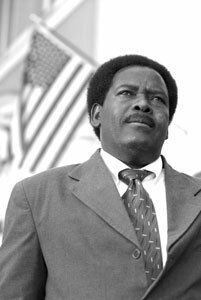FACETIME- Yahya's brotherhood: Refugee turns attention to Darfur
Mohamed Yahya has an unusual view of the explosive political entanglements currently facing the United States: "There is no genocide in Iraq, there is no genocide in North Korea, there is no genocide in Iran or Lebanon," he says. "We have only one genocide right now in the whole world."
The 45-year-old refugee from Darfur, the embattled western section of the Sudan, is currently campaigning for decisive American military action in the region because he believes that the U.S. is a beacon in times of crisis.
"Nobody else is trying to take initiative," says Yahya. "We failed Rwanda because of that, and right now we are failing Darfur."
So far, that failure may include hundreds of thousands of killings of civilians who have died at the hands of state-sanctioned marauders known as the Janjaweed.
The U.S. government has termed the situation "genocide," and in late August, human rights supporters watched with bated breath as the United Nations passed Resolution 1706.
Dedicating over 20,000 troops to the ongoing efforts to stabilize the region, the Resolution was the seed of a solution, but even though the UN now reports 400,000 deaths, still no U.N. peacekeepers have landed.
"Unfortunately it's just ink on a paper," says an understandably impatient Yahya, "Nothing was done to make it real."
So Yahya and Irish-born Charlottesville activist Maggie Murphy have teamed up to fuse music and politics at the local level with a Darfur awareness event taking place at the Martin Luther King Performing Arts Center on November 12.
Murphy says she's in it for the same reasons as a couple of better-known musical activists, Bono and Bob Geldof. "Being Irish and having had a famine where millions of people left the country," she explains, "it's very much on our minds."
If nothing else, Yahya hopes to drive home the message that the responsibility should trickle-down. Or is that trickle-up?
"We need those people to get back home to their kids, to their neightbors, to their senators, to their representatives," he says, "to tell them what is happening in Darfur."
That's precisely what Yahya did four years ago, when he moved from Cairo to Charlottesville to escape the assassination attempts his activism had begun to attract. He says he's still on a few hit lists back in the Sudan, but even though he went out seeking new neighbors in an attempt to spread the word, he still hasn't forgotten those he left behind: civilians subject to widespread, systematic slaughter.
"They have no voice, they are innocent people, they are armless, even," he says. "I have a responsibility to speak for them. I have become a voice for those who have no voice."
And none too soon.

Mohamed-Yahya
PHOTO BY JEN FARIELLO
#